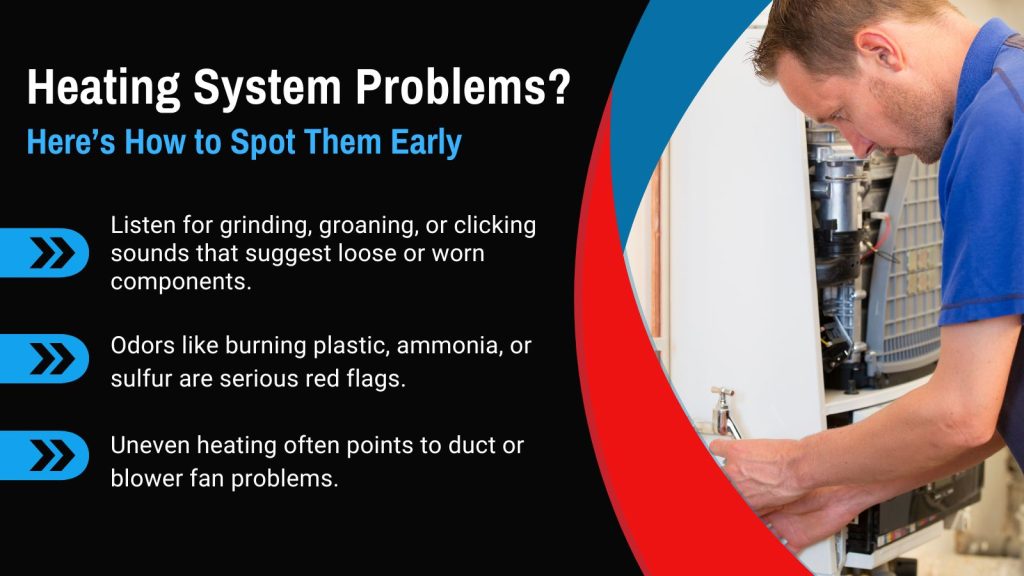The simple truth of any complex system is that when something goes wrong, having it repaired right away will stop the problem from getting any bigger. But that means you need to know as soon as possible when something starts to go wrong. There are certain warning signs that indicate furnace issues, and recognizing these early can help you avoid bigger problems and costly repairs. Furnaces, whether new furnaces or older furnaces, require regular maintenance to ensure optimal performance and longevity. Scheduling furnace maintenance before cold weather arrives is essential to prevent issues during winter, but maintenance can still be performed after cold weather begins if needed.
When it comes to your heating system, how can you tell you need to have repairs? Here are the clues to watch (and listen) for. Unusual noises are one of the most common warning signs of furnace issues and should never be ignored. And if you do need repairs, we’ve got a gift for you: $50 off your first service from us!

Introduction to Furnace Maintenance Service
A furnace maintenance service is the foundation of a reliable and efficient heating system, especially when temperatures drop and you need your home warm and comfortable. Scheduling regular furnace tune ups is one of the best ways to prevent unexpected breakdowns and keep your energy bills in check. During a professional furnace maintenance service, technicians thoroughly inspect, clean, and adjust your system to ensure it’s running at peak efficiency. This not only helps your well maintained furnace operate smoothly but also supports better indoor air quality by reducing dust and allergens circulating through your home. With regular maintenance, you can extend the lifespan of your furnace, avoid costly repairs, and enjoy peace of mind knowing your heating system is ready for the demands of winter. Investing in regular furnace tune ups is a smart way to keep your maintained furnace performing at its best, saving you money and stress in the long run.
Importance of Regular Maintenance
Regular furnace maintenance is essential for keeping your heating system in top condition. A furnace tune up allows professionals to catch small issues before they turn into costly repairs or require emergency repairs during the coldest days of the year. By scheduling annual maintenance, you help your well maintained furnace run more efficiently, which means it uses less energy and keeps your energy bills lower. Regular furnace maintenance also helps your system achieve optimal performance, ensuring your home stays comfortable without unnecessary energy consumption. Most furnace manufacturers recommend annual maintenance to keep your warranty valid and your furnace operating safely. Plus, a maintained furnace contributes to a smaller environmental footprint by reducing emissions and using less energy overall. With regular maintenance, you can enjoy reliable heat, fewer unexpected problems, and long-term cost savings.
Safety Concerns and Precautions
When it comes to keeping your home warm and comfortable, safety should always come first. A well maintained furnace operates not only at peak efficiency but also with a much lower risk of accidents or hazardous situations. One of the most serious concerns is carbon monoxide—a colorless, odorless gas that can be produced if the heat exchanger or combustion chamber develops cracks or leaks. Regular furnace tune ups are essential, as technicians inspect key components like the heat exchanger, ignition system, and burners to ensure everything is functioning safely and according to manufacturer’s specifications. Regular professional maintenance is often required to maintain the manufacturer’s warranty, so annual tune-ups help ensure your warranty coverage remains valid. They also check for gas leaks and verify that all safety controls are working properly. Regular furnace tune-ups offer several key benefits, including improved energy efficiency and extended lifespan of your heating system. By scheduling regular furnace tune ups, you can rest assured that your maintained furnace is running safely, helping to prevent dangerous situations and giving you peace of mind all season long.
Furnace tune ups are important because they help maintain safety by inspecting for gas leaks and carbon monoxide hazards, improve air quality by cleaning filters, ensure proper airflow by removing debris, enhance energy efficiency to save costs, and are necessary to uphold the manufacturer’s warranty.
Noises
Heating systems will always make some amount of sound, but they should be steady and consistent: the hum of the furnace, the whir of the fan. As with other mechanical or electrical systems—car, computer, coffee maker—an unexpected noise is generally a sign that there’s a problem. But what kind of problem is it? If you’re hearing strange sounds, it could be time for a repair. Learn more about unwanted heater noises and what they might mean.
Rattling might indicate a loose component or wobbly fan. Inspecting and cleaning the fan blades can help prevent or resolve these noises by ensuring they are free of debris and properly balanced. Clicking or buzzing can be caused by electrical issues. Inspecting electrical connections during maintenance can help identify and resolve issues that cause these sounds, improving system safety and efficiency. Grinding, groaning sounds can occur when the motor bearings wear down. And a terrible screeching noise might be a warning that the belt is tearing, stretching, or slipping out of position.
Odors
The smell of toasted dust is common the first time you turn on the heat in the fall, but this is entirely avoidable. Just make sure you have maintenance done each year, and your furnace will be perfectly clean, with no dust to burn. Other smells are signs that repairs are necessary, though.
Overheating components may smell like too-hot metal or plastic. An electrical fire can smell like fish, strangely enough. This is because the chemical reaction involved releases ammonia into the air, just like a decomposing fish on the beach. That’s a sign that you need emergency repairs. And if you smell eggs or sulfur? It’s a gas leak! Many furnaces use natural gas, so regular inspections and safety checks are important for natural gas systems to ensure safe operation. Evacuate, and get emergency assistance.
Short Cycling
The heat should come on and turn off fairly infrequently, only a handful of times per hour. If it shuts down almost immediately every time it comes on, and then tries to run again moments later, it’s a problem. This is called short cycling. Short cycling can interfere with accurate temperature control, making it difficult to keep your home comfortable. Incorrect thermostat settings can also contribute to short cycling, so it’s important to check and adjust them during maintenance. Not only is there something wrong which is causing the short cycling, if you allow it to continue, the short cycling itself will cause more problems! Get prompt heating repair in Prosperity, SC.
Poor Heat Circulation
Your heating system should make it possible for your whole home to be evenly comfortable. If some areas are totally cozy while others stay chilled, you have a heat circulation problem. It might be that there’s an issue with the ducts in part of your home, or it may be that the blower fan isn’t moving the hot air quickly enough. These issues can significantly reduce your heating system’s efficiency by restricting airflow and causing uneven heating. Resolving blower and duct issues is essential for maintaining your heating system’s efficiency and ensuring optimal performance.
Furnace Filter Replacement and Maintenance
One of the simplest yet most important maintenance tasks for your furnace is replacing the air filter. A good cleaning of the furnace filter and surrounding components is a crucial part of maintenance, ensuring your system operates safely and efficiently. A clean furnace filter helps your system run smoothly by allowing proper airflow through the blower motor and heat exchanger. When the air filter becomes clogged with dust and debris, it forces your furnace to work harder, which can lead to higher energy bills, reduced peak efficiency, and even costly repairs down the line. Changing the air filter can usually be done in just a few minutes, often with no tools required. Regularly changing your air filter—typically every one to three months—keeps your well maintained furnace operating efficiently and helps maintain good indoor air quality. Choosing the right filter for your system is also important, as some filters can restrict airflow if they’re not compatible. Keeping up with this simple maintenance step, along with regular cleaning of the air filter and other key parts, helps prevent buildup and extends the system’s lifespan.
DIY Maintenance Tasks
While a professional furnace tune up is always recommended, there are several simple maintenance tasks you can do yourself to help keep your furnace running smoothly. One of the most important is regularly checking and replacing the air filter or furnace filter. A clean air filter ensures proper airflow, which helps your furnace operate efficiently and keeps energy bills down. You can also carefully inspect and clean the combustion chamber, flue pipe, and blower compartment to remove dust and debris that can hinder performance. Checking the flame sensor for buildup and gently cleaning it can help maintain reliable ignition. These DIY maintenance tasks are easy to perform and can make a big difference in your furnace’s performance between professional tune ups. By staying on top of these simple chores, you’ll help your furnace run efficiently and reduce the risk of unexpected breakdowns.
Combustion Chamber Maintenance
The combustion chamber is where your furnace generates heat, making it a critical part of your heating system. Regular maintenance of the combustion chamber is essential for both efficiency and safety. Over time, dust, soot, or debris can accumulate inside the chamber, which can affect how well your furnace burns fuel and even lead to dangerous carbon monoxide leaks if left unchecked. By carefully cleaning the combustion chamber and inspecting it for signs of rust, cracks, or other damage, you can help prevent these risks and keep your furnace running smoothly. Regular maintenance of the combustion chamber not only protects your family from carbon monoxide exposure but also ensures your furnace operates at its best all season long.
Flue Pipe Inspection
The flue pipe plays a vital role in safely venting combustion gases, including carbon monoxide, out of your home. Regular inspection of the flue pipe is crucial to ensure there are no blockages, holes, or rust that could allow dangerous gases to leak indoors. During your maintenance routine, check that the flue pipe is securely connected to the furnace and free from obstructions like debris or animal nests. Any damage or blockage in the flue pipe can cause combustion gases to build up inside your home, posing a serious health risk. By making flue pipe inspection a regular part of your furnace maintenance, you help ensure your heating system operates safely and efficiently, protecting your family and your peace of mind.
Air Quality and Ventilation
A healthy home starts with clean air and proper ventilation, and your heating system plays a big role in both. Maintaining your entire HVAC system, not just the furnace, is important for optimal air quality and ventilation. Scheduling a furnace tune up ensures that air filters are cleaned or replaced, which helps remove dust, pollen, and other allergens from your indoor air. Regular furnace maintenance also includes checking the ventilation system for leaks or blockages that could compromise air quality or lead to moisture problems. Many furnace manufacturers require regular maintenance to keep the warranty valid, making annual tune-ups an important investment. By keeping your heating system in top shape, you’ll enjoy cleaner air, fewer allergy symptoms, and a more comfortable living environment. Plus, a well-ventilated home helps prevent mold and mildew, making regular furnace tune ups an important part of maintaining a healthy space for your family.
Carbon Monoxide Safety and Detection
Carbon monoxide safety is a critical aspect of furnace maintenance that should never be overlooked. Checking gas pressure is a key part of ensuring safe furnace operation and preventing carbon monoxide risks. A maintained furnace with a properly functioning heat exchanger and combustion chamber is far less likely to produce dangerous levels of carbon monoxide. Regular furnace tune ups allow technicians to inspect for cracks, leaks, or other issues that could lead to carbon monoxide buildup. An annual furnace tune up is essential for detecting and preventing carbon monoxide hazards. Installing carbon monoxide detectors throughout your home provides an added layer of protection, alerting you to any potential danger before it becomes a serious health risk. Make sure detectors are installed near sleeping areas and check their batteries regularly. By combining regular furnace maintenance, annual tune ups, and reliable carbon monoxide detectors, you can ensure your home remains safe, warm, and comfortable—giving you true peace of mind throughout the heating season.
Rising Utility Bills
The energy we need to heat our homes can be pretty costly. But if that cost keeps going up, even though nothing else has changed, it may well be that your heating system is using more energy than it should. Regular furnace maintenance, including annual tune up and regular tune ups, can help save money and achieve cost savings by improving energy efficiency and reducing energy consumption. This can result from a wide variety of problems. Annual HVAC maintenance can save homeowners between $100 to $500 annually compared to emergency repairs or replacements. Regular maintenance also helps prevent major repairs that can be expensive and disruptive. Get repairs done! You shouldn’t be paying extra for heat without getting any more bang for your buck. If you’re experiencing efficiency issues, a professional inspection can help—check out these common heating efficiency problems to see if your system needs attention.
An annual tune up and regular tune ups are recommended for all heating systems to ensure optimal performance and avoid costly repairs.
Heat pumps and air conditioners also require regular maintenance and tune-ups to ensure year-round efficiency and cost savings.
Contact Fulmer Heating & Cooling today for a heating expert in Columbia, SC!






